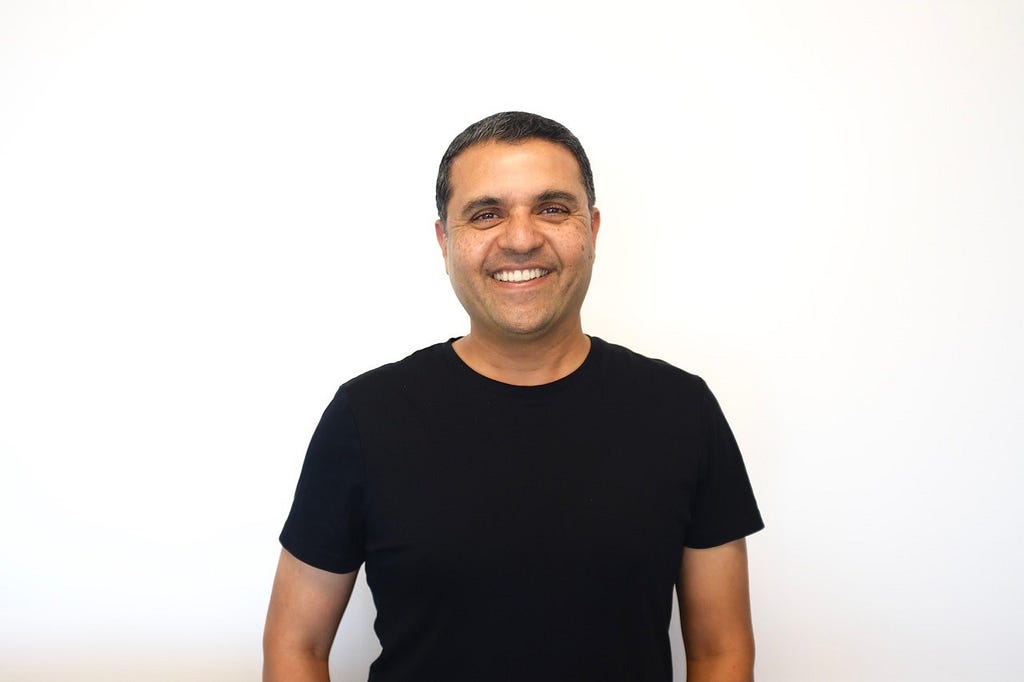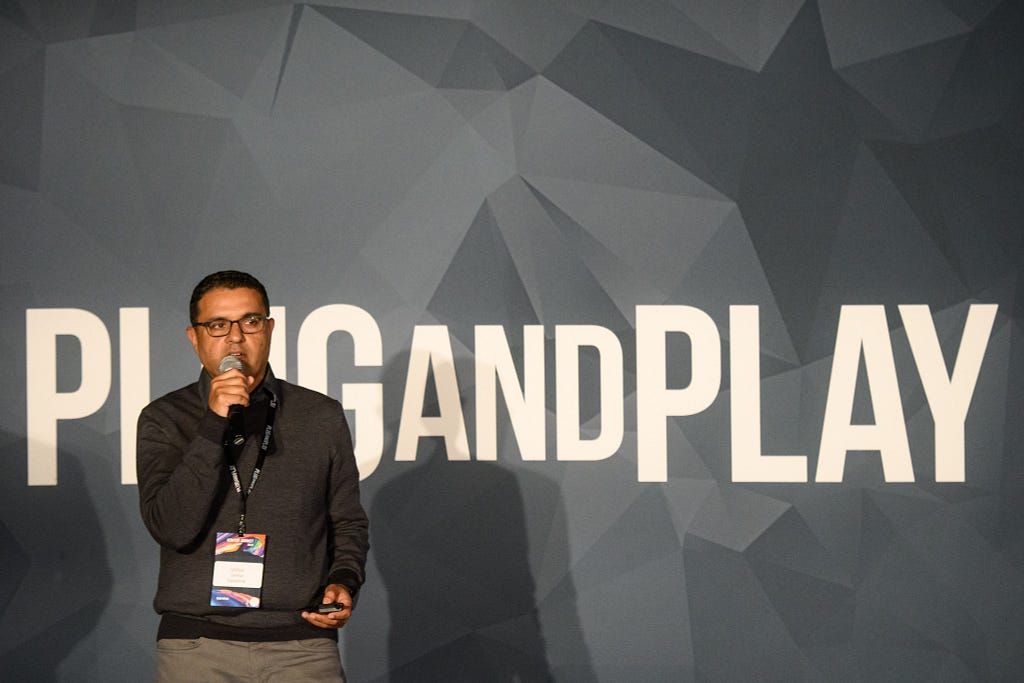
Empower Creativity — It’s more important for our employees to approach problems with unique approaches than to repeat what someone else has done. This creativity means we don’t always agree on everything, but we approach every conversation with respect.
I had the pleasure to interview Simha Sadasiva. Simha is co-founder and CEO of Ushur, a service engagement platform that uses artificial intelligence (AI), machine learning (ML), and robotic process automation (RPA) to digitally transform both backend processes and conversational interfaces.
Thank you so much for doing this with us! Can you tell us a story about what brought you to this specific career path?
I’ve been building software, architecting technology for IT and developing new algorithms and protocols in the industry for 25 years now. The last time Henry Peter, co-founder and CTO of Ushur, and Iwere founding engineers at a startup, we took it public in seven years. We work well together and know how to scale new technology in a sustainable way.
We saw through our work together that automating calls was driving down enterprise costs, but also noticed that phone calls are a smaller and smaller component of customer service. Consumers are more responsive to shorter messages and prefer different kinds of interactions — what we now call “micro-engagements.” The biggest challenge was realizing this was a legitimate business idea and conceptualizing how to turn it into a solution.
Can you share the most interesting story that happened to you since you began leading your company?
There have been a number of interesting developments since launching Ushur, many of which helped us to learn more about how people behave when facing challenges — including ourselves. There are two particular stories that come to mind. The first: I was on a red eye from San Francisco to New York to meet with a major potential customer. A woman sitting next to me woke up and saw that I was still practicing the presentation, she asked about it, was impressed and ended up connecting us to her company which is now one of our largest customers.
The other story was also around a major new customer pitch: My partner and co-founder Henry got sick the day before we were meant to fly out and couldn’t come, so we decided last minute to record the pitch on video and send it to the customer. We’ve realized our team has the will and ability to rise above challenges and do what’s necessary to take us to the next level. We’ve also been very lucky and recognize that has played a key role in getting us to where we are today.
Are you working on any exciting projects now? How do you think that will help people?
We’re heavily invested in LISA (Language Intelligence Solutions Architecture), which is an artificial intelligence engine that understands and can communicate in over 60 languages, as well as more than tends of thousands of documents and the specific information they contain. LISA can find information in response to specific questions and switch languages based on cues in the customers’ messages. LISA provides our cognitive FAQ capabilities and enables us to work with context-sensitive information and to better analyze language to identify industry trends.
Ok, lets jump to the main part of our interview. According to this study cited in Forbes, more than half of the US workforce is unhappy. Why do you think that number is so high?
It appears to me that the U.S. workforce has a lot of people who feel they have no upward mobility or opportunities to learn and grow professionally. People need to be able to exercise their creativity daily and believe their work each day is preparing them for the career paths about which they can feel proud and excited.
Based on your experience or research, how do you think an unhappy workforce will impact a) company productivity b) company profitability c) and employee health and wellbeing?
People who are unhappy in their work don’t take pride in it and don’t do their best. That will have a direct impact on productivity, profitability and health and wellbeing. If a business is declining, for example, and people don’t believe in the product or service they’re selling, that company will not last. The staff will reflect how they feel through the work they do and how they interact with customers.

Can you share 5 things that managers and executives should be doing to improve their company work culture? Can you give a personal story or example for each?
- Establish Career Paths — We coach our teams to establish career paths for themselves and to think about the work stories they want to be able to tell and establish a way for them to dictate their accomplishments.
- Empower Creativity — It’s more important for our employees to approach problems with unique approaches than to repeat what someone else has done. This creativity means we don’t always agree on everything, but we approach every conversation with respect.
- Encourage Collaboration — We feel strongly that energized teams can complete projects more efficiently when they are given creative freedom and are not stifled by management.
- Prioritize Results Over Hours — I choose not to “clock-in” employees so they have the freedom to deliver their best efforts and ideas. This helps employees deliver better results and encourages a healthier work/life balance.
- Be Flexible — By understanding employee needs, we can allow them to be their best in the workplace. It’s important to prioritize employee wellness in order to achieve organizational success.
It’s very nice to suggest ideas, but it seems like we have to “change the culture regarding work culture”. What can we do as a society to make a broader change in the US workforce’s work culture?
There are two changes that would greatly improve work culture in the U.S. The first is to fully embrace a work hard, play hard culture. People need a balance between their personal and professional lives, and it is key for society to recognize that as an asset, rather than a weakness.
The other necessary improvement lies in access to quality education and technology. With the tools they need to continue to learn and grow professionally, the workforce will be able to see and achieve upward mobility. That spurs an untapped drive that comes with hope and ambition.
How would you describe your leadership or management style? Can you give us a few examples?
I consider myself a “servant-leader” who is here to set up my employees for success, not to micro-manage them or control their every move. Sometimes being a good leader even means getting out of the way of my team’s work. By giving employees the framework they need to be successful and then giving them the room to run with it, I believe I’m setting up the organization for success.
None of us are able to achieve success without some help along the way. Is there a particular person who you are grateful towards who helped get you to where you are? Can you share a story about that?
It’s impossible to name just one person of the many who were instrumental in helping me get to where I am today. There were teachers, professional mentors, investors and advisors who have each played their own part in shaping me and the business. I had a math teacher who taught me to remain curious and never stop learning, a physics teacher who became a mentor I really admired, and a professional mentor who spent six months coaching me on how to turn the idea for Ushur into reality.
Finally, of course, there’s my family. Everything I have accomplished has been because my family has supported me and encouraged me to pursue my passions.
How have you used your success to bring goodness to the world?
I try to give back in whatever ways I can — even if they’re small. I spend time mentoring, volunteering as a math teacher/tutor and bringing Ushur together to give back as a team. Around Thanksgiving, we worked on a community event together where we trained fairly inactive 50-year-olds to run a 5K race. The common thread between all of the volunteer and philanthropic initiatives is empowerment — providing people with the support and training they need to achieve goals that would otherwise be insurmountable.
Can you please give us your favorite “Life Lesson Quote”? Can you share how that was relevant to you in your life?
In the sixth grade, our English teacher made us write two essays — “Time and Tide wait for no one” and “Health is Wealth”. Just the concepts of time and the mortality of the human life keeps me centered and helps me make daily decisions on how and what I spend my time on and the types of life choices I make.
You are a person of great influence. If you could inspire a movement that would bring the most amount of good to the most amount of people, what would that be? You never know what your idea can trigger. 🙂
The work we do with Ushur is hopefully the first step in inspiring a movement to fix the broken system of interactions customers have with providers — particularly in the insurance sector. There is friction and frustration, time wasted waiting on hold or making repeat phone calls, money wasted on incorrect claims or unnecessary processes and more. Rather than sitting on hold for 45 minutes, a new mom could spend that time with her baby. Instead of arguing with a representative who doesn’t have access to your records, you could spend that time strengthening a personal or professional relationship. Fixing this system will give people back their time, provide peace of mind and save them money. To me, that’s an incredibly powerful movement with positive impact on people and their wellbeing.
“5 things you need to do to create a fantastic work culture”, with Ushur CEO Simha Sadasiva was originally published in Authority Magazine on Medium, where people are continuing the conversation by highlighting and responding to this story.
